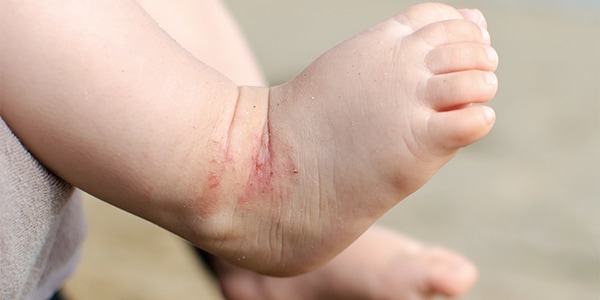Eczema: types, triggers and treatment
Red, itchy, dry skin is all too common among people with eczema, but the triggers and management can be different for each person.
Health Agenda magazine
July 2018
If you’ve regularly got red, inflamed or itchy skin, you may have eczema. It’s a common, chronic, non-infectious skin condition caused by your immune system. It’s also known as atopic dermatitis.
Eczema affects the corneal layer of the skin. This is the layer that we see and sits just above the epidermis. Its job is to protect the body from germs, but in people with eczema, the corneal layer doesn’t provide enough protection as it’s damaged by the inflammatory response occurring in the skin. These flare-ups can affect quality of life; they can be uncomfortable and sore and make it difficult to concentrate or get a good night’s sleep.
Eczema often affects children; University of Melbourne research says around 1 in 3 infants in Australia has it. While many children grow out of it, about 10% continue to have eczema as an adult, says the Eczema Association Australasia.

GP Dr Norm Southern explains the different types of this skin condition:
- Atopic eczema: An allergic eczema that is often associated with asthma and hay fever. Symptoms include dry scaly skin, itching, redness and open sores when severe. This is the most common form.
- Contact dermatitis: Occurs when the skin comes into contact with irritating substances or allergens such as jewellery or skincare products containing alcohol. Symptoms include redness and rash, itching and blisters.
- Dyshidrotic eczema: Usually triggered by stress but can also be caused by exposure to nickel or cobalt. Symptoms include small, itchy blisters on the edges of the fingers, toes, palms of the hand and soles of the feet.
- Nummular eczema: Develops as round lesions on the skin, with symptoms including itching, round spots and dry, flaky skin. It frequently develops on dry skin in cold weather.
- Seborrhoeic dermatitis: Often referred to as ‘cradle cap’ in infants. A mild version in adults is usually called dandruff. It’s partly genetic and hormonal. It is not an allergic reaction and usually occurs on the upper back, scalp and nose.
What causes eczema?
Why some people get eczema and others don’t is unknown. “It develops as a result of a combination of genes and environmental triggers,” explains Dr Southern.
People with eczema tend to have an overreactive immune system that, when exposed to a trigger, responds by releasing antibodies that produce inflammation, which causes the skin symptoms.
Accredited practising dietitian Chloe McLeod says a number of foods may trigger a flare-up in those with some types of eczema.
“Dairy products, eggs, soy, nuts and gluten are the most common culprits. Other culprits include a group of naturally occurring chemicals known as salicylates, amines and glutamate.”
Salicylates are found in some fruits and vegetables such as apples and spinach; amines are found in foods including cheese, red wine and bananas; glutamate is a flavour enhancer. Dust, grass and animals can also act as triggers for some people.
How to treat eczema
There’s no cure but regular skin care and medication can help to keep the itching and irritated skin at bay.
Dr Southern recommends avoiding soap as it contains various substances that can dry out the skin. Try a soap-free wash made for sensitive skin – ask your pharmacist for options.
“I also recommend avoiding long showers, as this actually makes the skin drier, and avoid known triggers such as nylon being worn next to the skin,” he says.
Eczema Association Australasia recommends wearing 100% cotton or soft fabrics and avoiding any rough, scratchy fibres and tight clothing.
Your pharmacy will have a range of creams that can help soothe eczema. Coconut oil can also have a soothing effect on contact dermatitis but it’s best to discuss any alternative treatments with your doctor first.
If you have eczema and think food might be a trigger, McLeod recommends seeing a dietitian to help identify the foods that are causing a flare-up.
“This is often done with an elimination diet that removes certain problem foods, followed by food challenges that reintroduce the foods to determine tolerance levels.”
Related Articles
YOUR GUIDE TO IMPORTANT CHECK-UPS FOR CHILDREN
When do you take your child to their first eye test or dental check-up? Here’s what you need to know.
SUPPORTING YOUR CHILDREN THROUGH CHANGE
As your children grow, their support needs change. We ask psychologist Giuliett Moran for her advice on helping your kids as they move through different life stages.
GLUE EAR IN KIDS
Glue ear can lead to problems with a child’s hearing, speech and behavioural development. Here’s how to treat it.
YOUR SKIN CHECK CHECKLIST
If caught early, skin cancer can be successfully treated so checking your skin regularly is vital.